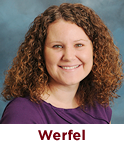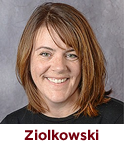Award Recipients 2018-2019
|
Yaroslaw Bazaliy, Assistant Professor, Physics and Astronomy, College of Arts and Sciences , General Physics I (PHYS 201), Collaborator: Timir Datta Yaroslaw Bazaliy teaches Physics 201, an algebra-based introductory physics course which serves undergraduates from health, life and earth sciences majors. With an enrollment of over 300 students, the typical teaching format is audio-video-assisted lectures 3 times per week with homework submitted on-line and automatically graded within the LON-CAPA environment. Students are given access to a department-operated help center, the so-called called CAPA-room where instructors or faculty members ‘man’ this help center during the week, however student participation is poor. Bazaliy initiated this project to establish an effective connection between the learners and existing but underutilized help resources in this large, traditional lecture-based introductory physics course. His goal is to provide academic support that will improve the student’s ability to succeed in this class. The project will impact students in the critical first weeks of the semester by providing encouragement and instilling in them a better understanding of the course’s demands and learning goals, simultaneously providing resources to reach those goals. At the completion of the project, it will be evaluated for its effectiveness and to consider transferring the technology know-how and early intervention duties to the regular department TAs/instructors, possibly in lieu of their current “CAPA-room” session assignments. |
 |
|
Naomi Falk, Assistant Professor, School of Visual Art and Design, College of Arts and Sciences, Introduction to Three-Dimensional Studies (ARTS 225), Intermediate Three-Dimensional Studies I (ARTS325), Advanced Three-Dimensional Studies I (ARTS425), Three-Dimensional Studies I (ARTS525), Workshop: Three-Dimensional Studies (ARTS529) Naomi Falk plans to add a hand-held 3D scanner and computer to run accompanying software, and related consumable materials, to allow her to learn, and then teach, 3D scanning, 3D modeling, and 3D printing. In addition, she will use programs such as Meshmixer, Adobe Illustrator, and Slicer 360 to create digital files for the laser cutter. The fabricated parts will then be used to build sculptures for most of the current assignments or as alternate projects. The additional skills gained through this project have crossovers in other areas and programs, including engineering, media arts, architecture, and medicine, and provide the students with greater employability. Using open-source software, students will have the ability to create three-dimensional objects virtually and after printing or laser cutting, construct them in real life, giving them the opportunity to learn and translate forms and materials in multiple modes. Finding more and varied ways to engage students by giving them the tools and empowerment to observe closely, ask inquisitive and thought-provoking questions, and develop their brainstorming and problem-solving skills will provide them an excellent knowledge base and enhance their critical thinking skills. |
 |
|
Sharon Gumina, Instructor, Department of Integrated Information Technology, College of Engineering and Computing, Introduction to Networking (ITEC-245) Sharon Gumina serves as the Instructor of ITEC 245, Introduction to Networking, a required course in IIT which introduces undergraduates to networking concepts, equipment and media, protocols, IP addressing, subnetting and routing and switching. Theoretical, technical, and applied topics are covered in ITEC 245. While students use the college’s existing computer labs when covering the theoretical and technical concepts, at present, there is no ability to demonstrate applied concepts. Students have access to a simulation tool, Packet Tracer, which allows them to configure intermediary devices and end points for routing and switching, but they do not have access to physical networking equipment for classroom activities. There is a need to expose the students to actual equipment and cabling in the classroom to perform labs. This grant is being used to give IIT students hands-on experience with industry level equipment by providing a portable platform that will give students hands-on training without utilizing any of the lab infrastructure. Intermediary devices, cables, adapters, and computer equipment will be used by students to perform various activities each week as they begin to understand how to connect, configure, and address networking equipment. Students will benefit from working with actual equipment, thereby enhancing their learning outcomes. |
 |
|
Daniela Jankovska, Instructor, Department of Retailing, College of Hospitality, Retail and Sports Management, Visual Merchandising and Store Design (RETL 365: ) The traditional RETL 365 class focuses on the fundamental elements of visual merchandising and store design (VMSD) and the relationship of store image and fashion promotion. Danielle Jankovska, Instructor in the Department of Retailing, plans to revise the course by including the implication and implementation of technology in the apparel and textile industry. This will provide a more practical, hands-on course in visual merchandising presentation utilizing computer aided design (CAD) programs, which are relevant for the industry. Topics covered will include Adobe Illustrator & Adobe Spark for fashion; VMSD displays (i.e. lighting, planograms, floorplans, fixtures and interactive media) reflecting the latest technology; and practices in store planning, design methods, window display locations and sustainable visual merchandising strategies. This plan provides students with VMSD contextual lessons as well as transferable skills that will enable the students to find better job placement and stand out from the crowd of applicants. The course revision will enhance active student learning, incorporate better pedagogical theories and teaching assessment material, and update the course curriculum in order to remain a competitive program. Additionally, the revision allows for the course to be updated for online distributed learning. |
 |
|
Jin Liu, Instructor, Educational Studies, College of Education, Classroom Assessment Methods (EDRM 723) EDRM 723 Classroom Assessment Methods is a three-credit hour, web-based course on the development of assessments to inform classroom instruction and management. By reviewing different forms of assessment students develop an understanding of the strengths and weaknesses of each form as well as the relationship between curriculum, standards, instruction, and assessment. Jin Liu, Instructor of EDRM 723, proposes to initiate technology integration and to employ technology tools such as Padlet, Flipgrid, and Piktochart to increase interactions among and between class members and to encourage engagement and learning. By re-designing the course, Liu can better satisfy the needs of students by improving various modes of interactions with technology integration in order to help them achieve course learning objectives. Liu plans to initiate the following plans: 1) use a new textbook with an e-book option allowing students to acquire up-to-date information from the new textbook, lecture videos and activities with appropriate technology tools on Blackboard and provide the students with an alternative concerning course consumption and 2) develop a learning module outlining the use of technology tools in assessment by employing the Technological Pedagogical Content Knowledge (Graham, 2011) model to guide students’ thinking in the process, 3) incorporate Universal Design for Learning (UDL) in the course to ensure that students maximize their learning, and 4) refine the peer assessment activities by creating a short training video for online peer assessment completion. Technical support will be provided to ensure that students can use these technologies to complete related course work. |
 |
|
Catlin Mardis, Clinical Assistant Professor, Department of Clinical Pharmacy and Outcomes Sciences, College of Pharmacy, Clinical Immunology and Transplantation (PHMY 756) Caitlin Mardis knows from experience that a single class can shape a student’s entire career. As a third-year pharmacy student at the University of South Carolina, she took an elective course entitled SCCP 756, “Clinical Immunology and Transplantation.” The course inspired her to continue her education in this area and culminated in directing her career choices. Her vision for PHMY 756 includes implementing flipped design components to allow students to utilize the time outside of class for deeper preparation to encourage the development of critical thinking skills and thus, expanding students to a broader level of knowledge about this information. Additionally, she will reduce the time spent on lectures and utilize that time to encourage more faculty interaction, student presentations and discussions on the assigned topics. She plans to incorporate more active learning assignments in the class such as dedicating a component of each class to “fact or fiction” in which students will evaluate transplant scenarios depicted in the media to determine whether they are realistic and accurate. The class revision will also include encouraging the students to meet real patients helps students connect back to their purpose in pursuing a career in healthcare and fosters an environment of diversity and inclusion, as it allows them to hear actual patient perspectives with regards to their health experiences. Experiential components and simulated patient care experiences that mimic both the inpatient and outpatient pharmacy practice settings will be added to better prepare students for their clinical rotations as well as their future careers. |
 |
|
Krystal Werfel, Assistant Professor, Communication Sciences and Disorders, Arnold School of Public Health, Aural Rehabilitation of Children and Adults (COMD 754-J50) Krystal Werfel proposes a revision to COMD 754-J50 Aural Rehabilitation, master’s level course in speech-language pathology. She plans to include more active learning in the distance education format. She will use Blackboard’s testing tool to teach clinical problem-solving skills and will develop three online clinical case modules. Her goals in revising the course are 1) to integrate evidence-based principles of active learning to increase the student’s ability to interact more deeply with the content of the course and to apply the content knowledge to clinical situations and 2) to provide students with the ability to obtain 375 hands-on clinical hours in part through simulation. The Innovative Pedagogy Grant supports the development of three case studies into simulation that contain video, active completion of test scoring and progress monitoring, and group pre-briefing and de-briefing components. Werfel sees her role in teaching as helping students to master content knowledge and to teach them how to be effective teachers with their future clients. She sees the revisions of the course as a means of challenging her students to master advanced content knowledge and cultivating their ability to think critically about issues in this field. |
 |
|
Lori Ziolkowski, Assistant Professor, School of Earth, Ocean, and Environment, College of Arts and Sciences, Oceans and Society (MSCI 210) MSCI 210 is a non-majors class taught every semester at USC. Over the course of a typical academic year, over 500 students enroll in MSCI 210. This course has been taught as an introductory to oceanography course with a few societal issues included at the instructor’s discretion. Lori Ziolkowski plans to revise the structure of the course by incorporating new pedagogical techniques, by restructuring the course content to center on societal issues, and by editing the labs to reflect the updated course content. Additionally, she will expand upon the pedagogical techniques used during lectures by employing techniques such as concept maps to impress upon the students the interconnected nature of the course content. She will explore the use of pre-lecture modules that introduce content to students before lecture and assess their understanding of the material. Her plan includes a move from a structure typical of introductory classes (e.g. physical, chemical or biological nature of the ocean) to a class that is centered around ocean related societal issues (storms, food, resources, climate). Her overall goal for this course revision is to develop an introductory oceanography course that incorporates more active learning and is more engaging for non-marine science students.
|
 |
